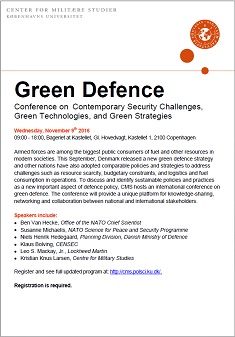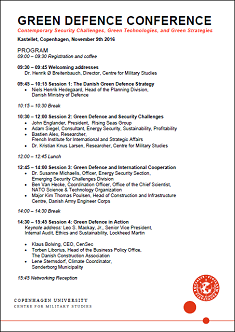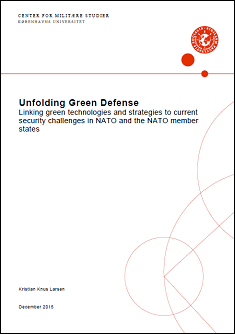Green Defence Conference: Contemporary Security Challenges, Green Technologies, and Green Strategies
National security has long prioritized effectiveness over efficiency. The armed forces are among the biggest consumers of fuel and other resources and often are among the largest emitters of pollutants.
Yet awareness of negative externalities, resource scarcity, budgetary constraints, operational challenges, and technological, organizational, and policy innovations have focused societal and governmental attention on—and enabled—improving efficiency while sustaining military effectiveness. Nations have adopted “green defence” policies and strategies to address these challenges and enjoy major benefits from adopting more efficient and sustainable practices, both separately and together.
Denmark released the latest iteration of its Green Defence Strategy, formally entitled The Ministry of Defence’s Environment and Energy Strategy: 2016–2020, on 23 September 2016 stating:
“The Ministry of Defence wants to create better conditions for the environment, nature, and climate as it performs its core tasks by reducing the volume of waste produced, reducing energy consumption, and reducing the impact on the surrounding ecosystem, its air and water,” all while increasing operational effectiveness. To facilitate this objective, the Ministry desires to foster collaboration, share knowledge, and communicate effectively with national and international partners and stakeholders.
As part of this effort, the Centre for Military Studies at the University of Copenhagen has organized a conference on Green Defence: Contemporary Security Challenges, Green Technologies, and Green Strategies.
Its purpose is educational, helping to socialize the notion that sustainable policies and practices can be considered in most, if not all, aspects of defence policy.
To do that effectively, we have aimed to bring together local stakeholders from the armed forces, the Ministry of Defence, other government ministries, municipalities that house defence installations, and local industry, as well as international stakeholders from NATO, the US government, and industry.
We are sure that this de facto community of practice will be able to communicate the multiple dimensions of sustainable defence policies and perhaps facilitate relationships that will benefit all.
Registration is required. Please follow this link to register no later than November 8.



